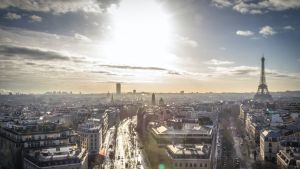Lost Lives, Little Attention: The Overlooked Migrant Crisis
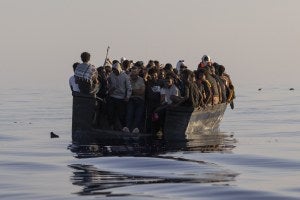 Play Podcast
Play Podcast
About the Episode
While the world closely followed the fate of five privileged men who went missing aboard a Titanic-bound submersible, a fishing boat crowded with migrants traveling from Libya sank in Greek waters. This upped the number of migrants who have died trying to reach Europe by sea this year to nearly 2,000. Award-winning journalist Sally Hayden joins Deep Dish to shed light on the underreported crisis of migrant treatment, the heartbreaking stories of those traveling on the world’s deadliest migration route, and the inadequate news coverage and resources dedicated to this humanitarian issue.
- My Fourth Time, We Drowned: Seeking Refuge on the World's Deadliest Migration Route, Sally Hayden, Melville House, March 29, 2022
[Lizzy Shackelford: INTRO: This is Deep Dish on Global Affairs— going beyond the headlines on critical global issues. I’m your host, Lizzy Shackelford, with the Chicago Council on Global Affairs.
As the world closely followed the revelation of five privileged men who went missing aboard a Titanic-bound submersible, a fishing boat crowded with migrants traveling from Libya to Italy sank in Greek waters, upping the number of migrants who have died trying to reach Europe by sea this year alone to nearly 2,000.
So, why do dozens of tragic stories of migrants lost at sea fail to capture the public's attention and concern in the same way?
Today, we will shed light on the underreported crisis of migrant treatment, delve into the heartbreaking stories of those traveling on the deadliest migration route, and consider the inadequate news coverage and resources dedicated to this humanitarian issue.
Here with me to explore this overlooked tragedy is Sally Hayden. Sally is a journalist focused on migration, conflict, and humanitarian crises and is the Africa correspondent for the Irish Times. She is the author of the book, “My Fourth Time, We Drowned: Seeking Refuge on the World's Deadliest Migration Route”-- Which is linked for you in the show notes.
And I wanna encourage all of our listeners to pick up her book, which documents the terrifying journey that thousands make every year across this migration route, and reveals the complicity of international organizations in the abuses that these migrants suffer along that route.]
Sally Hayden: The book is only the tip of the iceberg in terms of the people that I spoke to. and that's definitely only the tip of the iceberg in terms of the actual reality of what's happening in Libya and elsewhere as well. it's not like a homogenous group of people. There's people with so many different stories. You know, there are artists, musicians, dentists, doctors, former aid workers as well. For so many people are caught up in this system where basically everything that they have been before they got trapped in it has kind of been stripped from them. And one thing that I found kind of interesting was that, for example, like somebody who's fled Eritrea, a dictatorship, they had never necessarily met West Africans before. So suddenly they're all locked up together. They're all being treated the same, and they're like, we don't even know anything about each other's cultures. So, they're trying to learn that, and there's people fleeing a load of different situations like worst dictatorships, but also extreme poverty. And that's another thing that the book looks at, we call people economic migrants in those situations and like legally, they wouldn't necessarily, or they wouldn't have an international right to protection if they tried to claim that. But I'm in Sierra Leone right now, and for example, I was living here during the Coronavirus Pandemic and there was not one functional ventilator in the whole country. So, if you got covid and you needed a ventilator, you would just die. Um, at least one in 10 children die by the time they turn five. And like it has one of the highest maternal mortality rates in the world. The life expectancy here is about 25 years less than it is in a Western country. So, like, the people here would generally be classed as economic migrants, but that is also a risk to life in a way.
Lizzy Shackelford: What was the migrant crisis that led the EU to harden its approach to migration management? And what does that approach entail?
Sally Hayden: Obviously the year 2015 is what gets most focused on, and that's what gets called, the European migrant crisis. that year, 1.3 million people claimed asylum in, the EU. And a lot of people were coming from Syria, where there's obviously been a devastating war, but also a whole, load of other countries, fleeing wars, dictatorships, and extreme poverty and basically, it's always hard to say like why it's kind of been imagined as it has, but the fact that so many people arrived that year. and I say so many by the way, like that's been totally eclipsed by the number of Ukrainians now who have come in. But what we've seen is so many people arriving that year. Prompted a kind of backlash and a rise among far-right politicians and basically was latched onto by a lot of groups as a way, of them progressing I guess in a certain sense. And a lot of fears were stoked. There was a lot of, concerns as well, some of them obviously legitimate. And what happened in the aftermath of that was European politicians basically became fearful of this rise of the far right and decided that they needed to try and stop people from arriving that was what their electorates wanted. And so we've seen a host of attempts to stop people from reaching European territory where, a lot of them would actually have an international right to protection if they could get onto the territory. But the efforts have been pushed to Europe borders. So, there's been like huge amounts of funding being spent. For example, the EU Trust Fund for Africa is a multi-billion Euro pot of money that was designated as crisis or emergency spending to effectively stop. people from migrating or to keep them out. and we saw like the EU Turkey deal, which was done to again, spend huge amounts of money to try and stop people from crossing from Turkey to Greece. And I think like the European public, I mean, of course Americans, but even in Europe, people aren't fully aware of the efforts that are being made and the abuses that have resulted from them. And what I've specifically reported on is a deal that was done in the central Mediterranean, so that's known as the deadliest migration route in the world by the UN. And since 2017, What's been happening there is that the EU is basically circumnavigating international law, so they're conducting surveillance, flying drones, helicopters, planes to spot refugee migrant boats, and then they're also supporting the Libyan Coast Guard to intercept those boats and force people back to Libya. So, at this point more or roughly around 120,000 men, women and children have been caught at sea this way, forced back to Libya and often locked up in detention centers that have been compared to concentration camps. And that is a very deliberate circumnavigation of international law cuz a European vessel cannot return somebody to Libya. But a Libyan vessel can with European support. And that was the premise of my book. What is happening to these people, at the point that they're actually caught through European policy?
Lizzy Shackelford: Can you elaborate a little bit more on that Libyan side of the equation? You know, what happens when these, boats with migrants are intercepted, and how is the EU playing a role through that support specifically?
Sally Hayden: So I'm sure lots of people know about the history of Libya. Gaddafi was in power until 2011 and since then it's effectively been a failed state. It's kind of divided between government and militias and it's had kind of a growth In the smuggling business, like human smuggling business. So, it's a place where people come from all across Africa, even from Asia, sometimes in the Middle East. but fleeing all sorts of different situations and get to Libya and then try and cross the sea to get to Europe. And the traffickers and smugglers there are, highly abusive, Um, but. It's not so clear cut as to say these guys are traffickers and these guys are, you know, authorities. there's links between the smugglers and traffickers in that industry, the Libyan Coast Guard and the authorities, or even the militias who run the migrant detention centers. And what's basically been happening is that money is being pumped in so to, equipment training done for the Libyan Coast Guard. and then also money is being spent through the UN agencies to improve conditions in the migrant detention centers. But a lot of that funding obviously gets siphoned off for, misused or stolen. So yeah, you have like these migrant detention centers that are being run by militias. So, they're again ostensibly connected to the UN back government, but actually, they're being run by different militias and basically like every sort of abuse you can imagine is happening there. I mean, crimes against humanity, war crimes have been documented by an independent UN fact-finding mission. The ICC prosecutor has also spoken out about war crimes, crimes against humanity happening against refugees and migrants in Libya. And People continue to be returned there through EU policy.
Lizzy Shackelford: So I wanna talk a little bit about the context of the global refugee system and the kinda legal structures around this. No country is required to accept all migrants. Of course, we have a migration problem here in the US at our border as well. There are obligations and there's certainly scenarios where both international and EU law are being violated with the treatment of these migrants. But is there any recourse available for migrants who are in these situations and stuck in detention camps in Libya that are funded and supported by the EU?
Sally Hayden: Yeah, it's slightly arguable as to whether they are being violated because I guess that's how they've managed to get away with this. So far that, like I said, this is a kind of circumnavigation of international law and the core principle of the 1951 refugee convention is non refoulement, um, that asserts that a refugee should not be returned to a country where they face serious threats to their life or freedom. And so, like quite clearly that is being violated in some sense, but because it's the Libyan Coast Guard doing the actual physical interception, and they're bringing them back to the country that they come from, so, that's how there's kind of been a workaround found to that. do they have recourse to anything? No, they don't because like Libya is a country with no rule of law, so it's not like people are being locked up basically in these detention centers where they have a lawyer. There's no charge being taken against them. They're literally just being put in. There's not even a registration taken of who's in each center. like they can read in my book. What happens inside these centers? I've described it there as like each had its own particular definition of hell. And one question that I kept asking is how many people are dying when they're locked up in these detention centers? And I documented a lot of debt, but there was no record being taken of how many there were in total. And at one stage, there was a bombing, a direct hit on one of the detention centers, and there was, one person identified. I mean, we don't actually know their full death toll. It was said, I think, to be 54 by the UN. And witnesses said they thought it was higher, but only one person was actually identified, certainly in the media. And that shows you that there's like literally no record of who is inside the centers. And that obviously makes it very, very easy to exploit and abuse the people inside them.
Lizzy Shackelford: But the United Nations has a role with these centers somehow, doesn't it? I mean, do they visit? Do they see what the conditions are?
Sally Hayden: Yeah, they do. so basically my reporting started when I started getting messages from people who were locked up inside these detention centers. And I suddenly had a direct line of communication with, I mean, eventually like hundreds of people who had hidden phones, and this was over years, like in a range of different detention centers. And I'd be in touch with them every day. just receiving updates, you know, whenever there was a problem, they'd tell me. I mean, there were always problems, but more major problems particularly, and I ended up, which I know is not normally the role of a journalist, but I ended up like gathering information and sending it on to the organizations that were supposed to be operating in those detention centers. And often we wouldn't go public because it was incredibly dangerous for somebody. In this situation, they're not allowed to have a phone. the phone can be taken, which also puts them in extreme danger because they can't send a distress call. They could be tortured. They could be killed. but I started realizing very quickly, Because I had that direct line to people who were inside detention centers, and often I'd be in touch with like many people inside one detention center without them knowing that I was talking to the others, which helped with fact checking a lot. and I'd be in touch with the aid workers, but I started realizing that the statements that were being released publicly by organizations like the UN Refugee Agency were not necessarily the same as what I was being told about this situation, and I started talking to UN staff who actually said that they were worried that they were being used to whitewash the actual brutal reality of what was happening. And that kind of became clear when I would interview EU officials and say, how are you justifying the fact that people are being starved, we're being raped, you know, we're being tortured. Like there were all sorts of abuses happening. And when you ask them how they're standing over their policies that are sending people into these centers, they would say, well, we don't approve of the centers, but we're funding the UN to improve the conditions in them. So, then the UN staff would say they felt like basically they were being used to whitewash this policy, and because of the funding that they were receiving, which it turned out was coming from the same fund as the Libyan Coast Guard funding, they couldn't publicly speak out properly about what was happening. But what I documented was not just not publicly speaking out, it was actually giving false information in certain cases. And, this became also, the attitude of at least some people became clear to me when I asked a question about deaths that were happening in one detention center and the response came from a UN refugee agency official, that I shouldn't believe what I was being told by people who were in detention centers because. they had reason to lie, you know, that they might just be exaggerating the situation. And these were like officials that were meant to be representing refugees with politicians, you know, in Europe and elsewhere. And the fact that they weren't being believed was, really shocking for me.
Lizzy Shackelford: And in your experience in everything that you saw is your takeaway that the UN was doing more harm than good in how it was operating in Libya today? Or do you still see it having a helpful role?
Sally Hayden: I understand that the situation is very difficult and talking to staff there, you can understand that there are people there who do want to do good, and they're slightly torn as well. And one thing that became quite clear is that basically MSF was the only international NGO working in detention centers that wasn't receiving money through this EU fund. So the UN was distributing money. To so-called partner organizations and so all of them felt under the same constraints as well when it came to actually speaking out. Because they were also receiving EU money from the same fund. MSF was the only one who refused to take it. Are they doing more harm than good? I don't, I don't know, but I just think that, like to understand the gravity and the severity of a situation, you need to actually have the facts being presented to you. And I think that a lot of what is happening is like a distancing. We're being allowed to like switch off from the abuses and from the violations of human rights that are happening. I mean, by us, I mean us in Europe, or US in the West. And that maybe we take these statements at face value when they're being issued by agencies that are being funded by our governments who don't want people to actually reach our territory, if that makes sense. And I think one thing I wanted people to question themselves when they read the book and what I started questioning was whose voices are we actually listening to and who are we actually believing and trusting, and what damage might that be doing right now?
Lizzy Shackelford: Absolutely. And that is a really fascinating part of your book because it really does tell the stories from the perspectives of the migrants who are experiencing this. Why do you think that the plight of these migrants isn't captivating the same level of interest? particularly in the West and with western audiences that we see with, incidents like the five people on the tourist submersible that recently disappeared. Why do you think these refugee and migrant stories aren't, raising more alarm?
Sally Hayden: Yeah, I mean, that's a really hard question to answer and I don't fully know that I have the answer to it. I think certainly I've been asking myself a lot of questions as to what was my role in all of this. So I've been working as a journalist now for a decade, and I've reported a lot on migration and even like things like. when I use the word migrants in a headline, is that already dehumanizing people or is that already giving the audience the chance to kind of other them and not realize that these are, people like you and me? And migrant is justa descriptive term really, isn't it? And refugee is like a legal status. So neither of those actually define who a person is or, say much about their hopes, their dreams, their families, any of that. And actually, after the latest shipwreck, my newspaper that Irish Times asked me to write about it. And first I was like, there's no point cuz I've written the same story over and over again. Like, why should people care about this? And I was like, obviously they should care about this, like what else can I say? But I did end up doing a story and I just said exactly that. Like, the people who died are people. And how has it become that we are allowing mass deaths to happen on a pretty much daily basis and not actually responding to it. And why has the right for life become up to debate? when we hear politicians going, should we this or should we that? Like actually what they're saying is often, should people be allowed to live or not? And it's really disturbing and I think it's important to keep reiterating like more than 27,000 people have died in the Mediterranean since 2014. And those numbers are said to actually probably be like a underestimate and when you consider that amount of people, like it's completely shocking and it's just continuing to rise and rise and rise and there hasn't been a reckoning
Lizzy Shackelford: Well, Europe's migration problem is one of the biggest political issues that's frequently debated. And as you mentioned kind of back in 2015, it was very politically damaging and helped, with, the rise of right-wing politicians. Do you have any thoughts on what Europe's approach to the migrant issues should be?
Sally Hayden: I think that first of all people need to inform themselves, like I've seen in Europe, a very deliberate effort to distance, policy from the consequences of those policies. For example, I asked Frontex, the EU Border Agency, a spokesperson, like, how many people are dying when they get intercepted by the Libyan Coast Guard? And they said, oh, we don't know. Like, that's not our duty to document because Libya is a sovereign state. And I was like, well, they're being intercepted because of your policies. So I don't know how you can distance yourself from the actual consequences of those policies. And when we hear terms like migration management, which gets used a lot here in Europe, again, that's like a type of term that is distancing us from the actual reality of what that means, which might be like huge numbers of debt, you know? I just think people, informing themselves and informing themselves about the lack of safe and legal roots. You know, that's also something that I've looked at. I reported on a corruption scandal in the UN Refugee Agency in Sudan, where UNHCR officials were accused of taking bribes of like up to $20,000 to resettle a family to a safe country. And in the aftermath, there was one official found guilty of soliciting bribes and abusing power. I interviewed afterwards a un former UN investigator who had uncovered a similar scheme in Kenya like quite a while before, and he basically said when there's like tiny supply and huge demand, you're always going to have exploitation and abuse and that's basically just how these things naturally develop. And I think when we talk about safe and legal routes, there also needs to be an understanding of how they actually operate in practice and the limitations and the suffering that people are put through trying to avail of them. One thing that I've been thinking about, and this is not like a totally fully formed thought, but I was in Somalia twice last year. Where there's a devastating drought, and tens of thousands of people are said to have died because of it. I was in one IDP camp where I counted 101 graves of small children who had died in the few months before I got there. And that made me think a lot too, because when we talk about foreign aid, you know, if you can get one Somali to a western country, they can work and send back money directly to their families and keep them alive. And that drought is said to be the result of climate change. So, we are the ones in the west producing the emissions. Somalia is basically producing no emissions and. if you get one person to the west, they can support their family. But if we send huge amounts of foreign aid to organizations that have huge overheads, and I'm not saying that should not happen at all, but, you know, it's a much less direct, sometimes form of foreign aid. I think it's something to consider.
Lizzy Shackelford: Sally Hayden author of the book, My Fourth Time, We Drowned: Seeking Refuge on the World's Deadliest Migration Route --- a remarkable book, I think everyone should read it. And thank you so much for helping us gain a better understanding of these challenges faced by people who are fleeing desperate places around the world.
Sally Hayden: Thank you so much for having me.
[Lizzy Shackelford: OUTRO: And thank you for tuning in to this episode of Deep Dish!
A reminder that we wanna hear more from you, our listeners. So send us an email, or better yet, a voice memo to deepdish@globalaffairs.org -- You can suggest issues you'd like us to cover, guests you'd love to hear from, or you can just let us know how you think we're doing!
And if you're looking for more Deep Dish in your podcast diet, tap the follow button in your podcast app so you get each new episode as it's released. And if you think you know someone who would like today's episode, please share it with them.
As a reminder, the opinions you heard belong to the people who express them and not to the Chicago Council and Global Affairs. This episode is produced and edited by Kyra Dahring and mixed by Frank McKearn at Aphorism Productions.
Thank you for listening. I'm Lizzy Shackelford and my co-host Brian Hanson will be back again next week with another slice of Deep Dish!]




Related Content
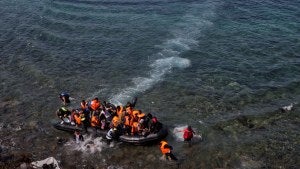 Migration
Migration
“A policy of keeping migrants away from European shores at any cost has also cost Europe its credibility,” writes Elizabeth Shackelford.
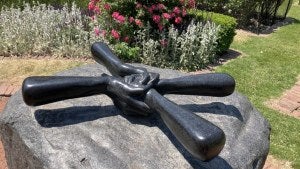 Global Cities
Global Cities
City leaders must promote solidarity between local communities and asylum seekers, who face many of the same challenges as long-term residents, argues Valeria Castelli.
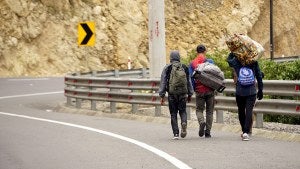 Migration
Migration
The movement of Venezuelans across the Western Hemisphere highlights the need for regional coordination.
